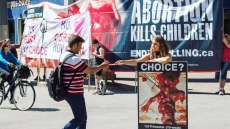VICTORIA — British Columbia's plan to get big money out of politics and shake off its reputation as the Wild West of election campaign financing comes with a potential cost to taxpayers of almost $30 million over the next five years.
Attorney General David Eby introduced legislation Monday that bans donations to political parties by unions and corporations and caps donation limits by individuals at $1,200 annually.
The proposed changes to the Election Act include a taxpayer-funded, five-year allowance to wean the parties off those donations, Eby said.
Starting next year, political parties will receive $2.50 for every vote they got in the last election and funding will drop by 25 cents each year until 2021, the minister said.
It means both the Liberal and New Democrat parties will receive just over $8.1 million over five years, while the Green party will get $3.4 million.
The changes would also ensure that the parties that get at least 10 per cent of the vote are reimbursed for half of their expenses — an estimated cost of $11 million.
Eby acknowledged the NDP did not fully address its position on a vote subsidy before or during the election campaign. He said the government considered implementing a permanent vote subsidy after the May election, similar to Quebec's system, but decided on the five-year allowance instead.

"This bill takes $65 million out of the political system going forward," said Eby, referring to the estimated amount that B.C.'s political parties would have fundraised for over the next five years. "We guaranteed the public we would make 2017 that last big money election in B.C. We believe this bill achieves the goal."
He said the legislation also bans out-of-province donations and caps contributions to third-party advertisers. The proposed law does not permit political parties to use the money they have raised since last May's election to be used in the next election, Eby said.
Elections BC, the agency that monitors provincial elections, reported the Liberals raised $13.1 million in 2016, while the NDP took in $6.2 million and the Greens raised $757,268. None of the parties have officially disclosed how much money they have fundraised since the election.
Premier John Horgan said the legislation will take big money out of B.C. politics.
"The Wild West financing of the past will come to an end," he said. "It's time elections were decided by voters, not by those with the most money in the kitty. This bill is what we campaigned on."
Andrew Wilkinson said the Opposition Liberals will vote against the proposed bill, saying taxpayers should not be funding political parties.
"This is a big disappointment," he said.
Green party caucus spokesman Adam Olsen said the influence of special interests through the lax campaign finance laws led to cynicism from those who felt their voices hadn't been heard.
"British Columbians should be able to trust their government to put them, not special interests, first," he said in a news release. "This legislation is a big step towards restoring that trust."
Per-vote funding isn't a new idea. The federal Liberal government introduced such a subsidy in 2004 after banning political donations from unions and corporations.
The Conservatives vowed in 2008 to do away with the $1.95 per-vote subsidy, with then-prime minister Stephen Harper saying political parties should have to rely on support from individual citizens, not all taxpayers. The allowance was phased out and ended in 2015.




